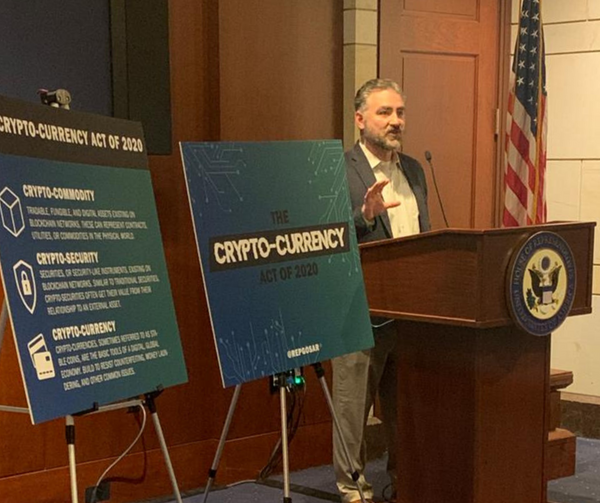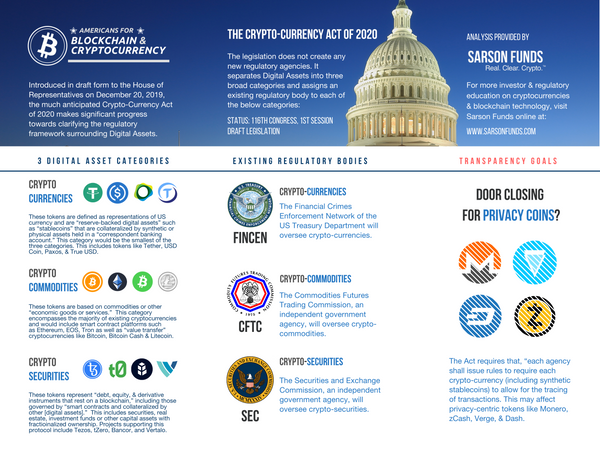WASHINGTON, DC - Days before coronavirus sparked a financial market meltdown, a piece of legislation introduced to the Congress last week offered a start at providing Americans with a chance to more clearly and safely consider a new alternative form of investing - cryptocurrencies. Sarson Funds, a cryptocurrency investment and education firm, lauded the bill’s efforts, as in recent days cryptocurrencies have risen sharply following their mutual sell-off alongside Wall Street.
The Crypto-Currency Act of 2020, sponsored by Paul Gosar (R-AZ), proposes a broad classification framework for key cryptocurrencies and digital assets, assigning an existing federal oversight agency without creating an additional government body. For proponents, it offers a real chance for cryptocurrencies, like Bitcoin, to shed an image marred by blackmarket scandals in its past.
While some online crypto enthusiasts abhor government oversight, financial advisors and institutions view basic regulatory measures as a move towards legitimizing digital assets as a viable alternative for investors. Perhaps not for this crisis, but at least for the next one.
However, the bill's cold reception from some cryptocurrency media outlets prompted disappointment from registered investment advisors who voiced concern that turf issues and a small well-funded few in cryptocurrency’s small but growing DC lobbying circle have stymied regulatory efforts and become entrenched in the old glad-handing ways of traditional DC politics.
Sarson Funds Managing Partner & CEO John Sarson said, “We were disappointed that CoinDesk’s coverage of the bill did not accurately represent broad industry sentiment." Sarson noted that their 100-member strong Blockchain Insider group, a forum comprised of leading cryptocurrency professionals, as well Americans for Blockchain & Cryptocurrency PAC enthusiastically supported the legislation.
Congressional staffers who worked on the bill also expressed frustration with the Blockchain Association’s refusal to participate in crafting the Crypto-Currency Act, despite numerous outreach attempts.
The Blockchain Association is a relatively new entity, active for over a year, compared to the more established and widely recognized Chamber of Digital Commerce. Dubbing themselves as the “unified voice of blockchain” the group supports their own cryptocurrency bill, The Token Taxonomy Act, which has stalled in committee. The Blockchain Association is backed by the Digital Currency Group, another DC-based firm, who coincidentally also owns CoinDesk.
Also pushing back alongside the Blockchain Association was CoinCenter, another DC-based cryptocurrency advocacy firm with their own team of retained lobbyists. CoinCenter’s Jerry Brito remarked that, ”China intends to launch a national digital currency that will let the government easily surveil spending. Following in their footsteps would be a mistake.”
Jahon Jamali, Sarson Funds other Managing Partner and himself a former US intelligence officer, called Brito’s China comparison “absurd.”
Speaking at the Crypto-Currency Act’s introduction, Jamali said, “There needs to be some level of transparency in digital asset blockchains. The Treasury Department archaically tracks dollar bills for anti-fraud, anti-terrorist funding, and anti-money laundering activities - activities that harm our society and weaken the market. Serious investors need to know that those safeguards exist with cryptocurrency and in the American financial system. As other nations pass legislation to normalize digital assets, our laggardness in embracing cryptocurrencies is becoming a vital national security concern. The blockchain wars have started and China is winning.”
Now that the Crypto-Currency Act has been introduced, its future remains unclear amid the greater market and political turmoil surrounding the world’s COVID-19 response. However, the House Finance Committee is set to hold hearings on cryptocurrency and blockchain related bills in May.
In the meantime, Sarson Funds continues to educate financial advisors and investors on digital assets and cryptocurrencies. “Transparency and safety is a hallmark of how we approach cryptocurrencies with financial advisors” said Sarson. He continued, “We hope that the cryptocurrency public policy proponents can regain touch with digital asset investors and come together to forge a reasonable and transparent path forward. American investors deserve it.”




